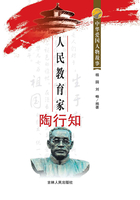The question: "What shall I do in the future?" now came to me. That afternoon I laid my plans which I would carry out out in the years to come. I was financially ruined in the great battle I carried on with the Atchison ring. I was aware of the fact that, when I got out of the penitentiary, all the money that I would have with which to make another start in life would be five dollars. The United States presents her prisoners, when discharged, with a suit of citizen's clothes and five dollars. This was my capital. What could I do with five dollars, in the way of assisting me in getting another financial foot-hold in life? After my release it was necessary for me to do something at once to get money. It never entered my mind to borrow. Itwill be interesting to the reader to know what I did, after my prison days were past, to make a "quick raise." Sixteen months of imprisonment slipped away. I regained my liberty on Monday. I received my five dollars and immediately started for my home, in Atchison. On my arrival, Monday night, I had four dollars and ten cents. On Tuesday morning I went to the proprietor of the Opera House, in Atchison, and inquired how much money was necessary to secure the use of the building for the next evening. "Fifty dollars,"was his reply. I gave him all the money I had, and persuaded him to trust me for the rest. I informed him that I was going to deliver a lecture on my prison life. He asked if I thought anybody would come to hear a convict talk. In answer, I told him that was the most important question that was agitating my mind at the present moment, and if he would let me have the use of the Opera House we would soon settle that question. I further told him that if the receipts of the evening were not enough to pay him for the use of the house, that I would pay him as soon as possible. He let me have the use of the house. I advertised in the daily papers of the city that I would lecture in the Opera House the following evening on my prison life,--admission fifty cents. I thought if the good people wanted to come at all they would come even if they had to pay well for it. I was very restless from the morning that I engaged the Opera House until the next evening, at which time I was to speak. I did not know whether I would have any audience. If not, I was fifty dollars deeper in debt. The evening for the lecture came, I went to the Opera House prepared to interest anyone that might put in an appearance; I entered the building in the rear, and took my position on the platform. The signal was given and up went the curtain. I was highly pleased when I saw my audience. The building was packed. The lecture was a financial success. In this manner I secured a nice "stake" for future use. I delivered that lecture for several weeks in Kansas, and made a thousand dollars above expenses. To return to my first afternoon in the cell. I thought of another scheme. I conceived the idea that a book about, a penitentiary, giving its history, and also the history of many of the leading criminals, modes of punishment, escapes, etc., would be very interesting, and would sell. I decided to write such a book while in prison. In order to write a book it became necessaryto have writing material. How was I to secure this? It was against the prison regulations for a prisoner to have a lead-pencil or scrap of paper. The officials were very strict on this point. It was essential they should be. If the prisoners could pass notes, it would not be long before a prison insurrection would be the result. The plan that I adopted to secure writing material was rather unique, and perhaps the reader will like to know how I managed this difficult matter. It is wonderful what a man can accomplish, with adverse surroundings, if he wills it. As I have stated before, I had much to do in securing the election of Hon. W. D. Gilbert to the district judgeship. This made him feel very kind toward me. He came often to visit me at the prison. One day while visiting me, I asked him to use his influence with the warden to secure for me the privilege of having writing material in my cell. "What do you want with writing material," said he. The answer I gave was, that I might pass away my leisure hours in learning to write short-hand. He called on Warden Smith, and got his consent. He told the warden that if I would master this useful art while in prison, on my release, he would appoint me his district court reporter, at a salary Of $2,500 a year. The scheme was a success. I sent and got my short-hand books and writing material. I mastered short-hand, and can now write as fast as one would care to dictate. It was not long before I began writing my book in short-hand. The officials, as was their custom, would examine my cell daily to see if anything had crept in that did not belong there. They could not read short-hand. They did not know what so many little straight marks and curves indicated. I persevered, and one month before my time expired I had my book completed, and sent it out by a friend who visited the prison, who kept it for me until I secured my liberty. As before stated, I lectured until I got money sufficient, and then I published my first book on prisons, giving it the impressive title of "A Kansas Hell." This book sold rapidly, and soon the first edition was disposed of. I made enough money out of this book to place me on my feet, financially. But, to return to my cell the first afternoon. I remained alone until time for the prisoners to come in from their work, when I found that I was to have a "life man" for my cell-mate, whose name was Woodward R. Lopeman. I have given his history in a subsequent chapter. I remained inmy cell during the evening, until the prison bell rang for retiring. Strange to say, after going to bed, I soon fell asleep, and did not awake until the prison bell rang on the following morning. When I did awake, it was to find myself, not in my own pleasant little home in the city of Atchison, Kansas, but in a felon's cell. I arose and dressed, and then waited and wondered what would be the next thing on the programme.
同类推荐
热门推荐
追妻无门:女boss不好惹
青涩蜕变,如今她是能独当一面的女boss,爱了冷泽聿七年,也同样花了七年时间去忘记他。以为是陌路,他突然向他表白,扬言要娶她,她只当他是脑子抽风,他的殷勤她也全都无视。他帮她查她父母的死因,赶走身边情敌,解释当初拒绝她的告别,和故意对她冷漠都是无奈之举。突然爆出她父母的死居然和冷家有丝毫联系,还莫名跳出个公爵未婚夫,扬言要与她履行婚约。峰回路转,破镜还能重圆吗? PS:我又开新文了,每逢假期必书荒,新文《有你的世界遇到爱》,喜欢我的文的朋友可以来看看,这是重生类现言,对这个题材感兴趣的一定要收藏起来。嫁入豪门
《嫁入豪门》是《中国当代名家小说系列》之一。范小青的《嫁入豪门》描写平民女子与“豪门”夫家种种琐碎的生活冲突,将人生况味蕴于日常琐事之中。本书还收录《哪年夏天在海边》、《你要开车去哪里》、《暗道机关》、《我们都在服务区》、《生于黄昏或清晨》等九部中篇小说。范小青,江苏苏州人,当代著名作家。现为中国作协全委会委员、江苏省作协主席、党组书记。著有长篇小说《城市表情》《女同志》《赤脚医生万泉和》等,中短篇小说《瑞云》《我们的战斗生活像诗篇》《父亲还在渔隐街》《城乡简史》《谁能说出真相》等,电视连续剧《费家有女》《干部》等。有多种作品被译成英、法、日、韩等文字出版。短篇小说《城乡简史》获第四届鲁迅文学奖、全国优秀短篇小说奖,《谁能说出真相》获第四届《北京文学》奖。中篇小说《父亲还在渔隐街》获第十三届《小说月报》百花奖。















